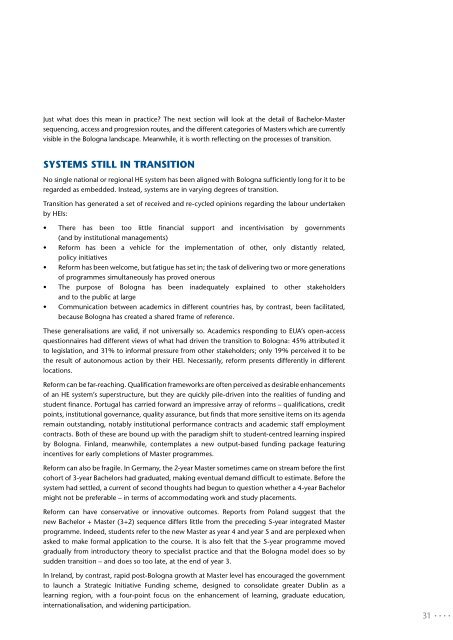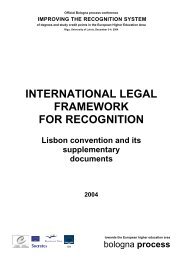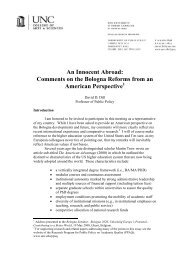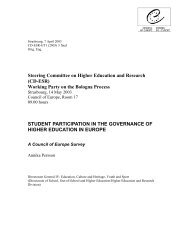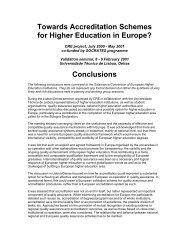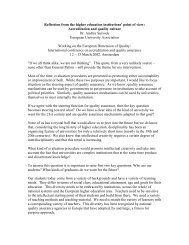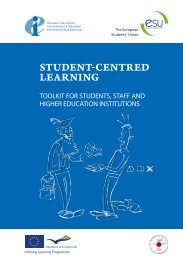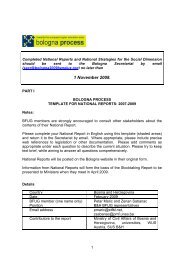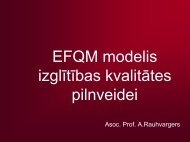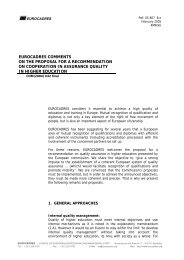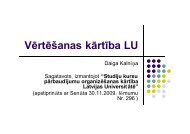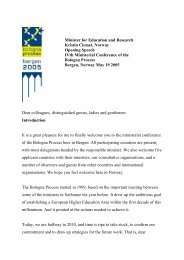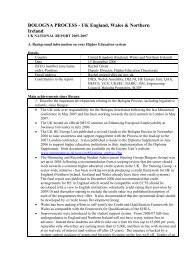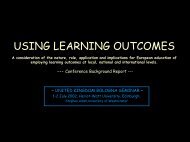EUA Survey Of Master Degrees In Europe - European University ...
EUA Survey Of Master Degrees In Europe - European University ...
EUA Survey Of Master Degrees In Europe - European University ...
You also want an ePaper? Increase the reach of your titles
YUMPU automatically turns print PDFs into web optimized ePapers that Google loves.
Just what does this mean in practice? The next section will look at the detail of Bachelor-<strong>Master</strong>sequencing, access and progression routes, and the different categories of <strong>Master</strong>s which are currentlyvisible in the Bologna landscape. Meanwhile, it is worth reflecting on the processes of transition.Systems still in transitionNo single national or regional HE system has been aligned with Bologna sufficiently long for it to beregarded as embedded. <strong>In</strong>stead, systems are in varying degrees of transition.Transition has generated a set of received and re-cycled opinions regarding the labour undertakenby HEIs:• There has been too little financial support and incentivisation by governments(and by institutional managements)• Reform has been a vehicle for the implementation of other, only distantly related,policy initiatives• Reform has been welcome, but fatigue has set in; the task of delivering two or more generationsof programmes simultaneously has proved onerous• The purpose of Bologna has been inadequately explained to other stakeholdersand to the public at large• Communication between academics in different countries has, by contrast, been facilitated,because Bologna has created a shared frame of reference.These generalisations are valid, if not universally so. Academics responding to <strong>EUA</strong>’s open-accessquestionnaires had different views of what had driven the transition to Bologna: 45% attributed itto legislation, and 31% to informal pressure from other stakeholders; only 19% perceived it to bethe result of autonomous action by their HEI. Necessarily, reform presents differently in differentlocations.Reform can be far-reaching. Qualification frameworks are often perceived as desirable enhancementsof an HE system’s superstructure, but they are quickly pile-driven into the realities of funding andstudent finance. Portugal has carried forward an impressive array of reforms – qualifications, creditpoints, institutional governance, quality assurance, but finds that more sensitive items on its agendaremain outstanding, notably institutional performance contracts and academic staff employmentcontracts. Both of these are bound up with the paradigm shift to student-centred learning inspiredby Bologna. Finland, meanwhile, contemplates a new output-based funding package featuringincentives for early completions of <strong>Master</strong> programmes.Reform can also be fragile. <strong>In</strong> Germany, the 2-year <strong>Master</strong> sometimes came on stream before the firstcohort of 3-year Bachelors had graduated, making eventual demand difficult to estimate. Before thesystem had settled, a current of second thoughts had begun to question whether a 4-year Bachelormight not be preferable – in terms of accommodating work and study placements.Reform can have conservative or innovative outcomes. Reports from Poland suggest that thenew Bachelor + <strong>Master</strong> (3+2) sequence differs little from the preceding 5-year integrated <strong>Master</strong>programme. <strong>In</strong>deed, students refer to the new <strong>Master</strong> as year 4 and year 5 and are perplexed whenasked to make formal application to the course. It is also felt that the 5-year programme movedgradually from introductory theory to specialist practice and that the Bologna model does so bysudden transition – and does so too late, at the end of year 3.<strong>In</strong> Ireland, by contrast, rapid post-Bologna growth at <strong>Master</strong> level has encouraged the governmentto launch a Strategic <strong>In</strong>itiative Funding scheme, designed to consolidate greater Dublin as alearning region, with a four-point focus on the enhancement of learning, graduate education,internationalisation, and widening participation.31


